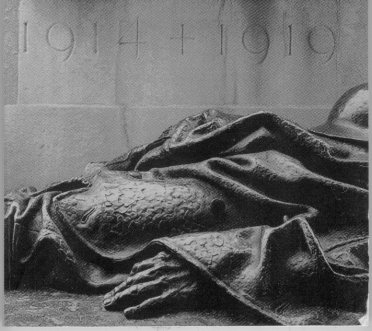
Today's Anzac commemorations bring many reflections on the nature of war. Here very briefly is mine.
War is brutal, destructive, and unutterably horrific. It is heart-breakingly tragic for all involved. War is hell. Wars very rarely have winners, only those who have lost the least. War, as The Age said, "is a dangerous and terrible thing, which should only ever be seen as a last resort."
In short, war is the second-worst thing on earth.
Like economic depressions and murder by concentration camp, wars are neither acts of nature nor 'Acts of God': Wars are acts of man -- of men who hope to achieve their values by violence, and who will do so if others do not rise to defend their own lives and their own values. Wars are the result of aggression by those who see value only in force, and who see other human beings as chattel.
They are the second-worst thing on earth only because the very worst is tyranny, an act of war by governments against those they are supposed to protect. It is with the existence of tyrannical governments and of movements intent on inflicting tyranny and oppression against others that wars of conquest and campaigns of terror begin. It is those who seek their values through violence that makes war possible; it is the existence of such entities that make wars of self-defence and liberation necessary.
It is not enough simply to declare oneself against war and wish war's destruction would go away. Pacifism itself only rewards aggression. Pacifism kills. It is necessary to oppose aggression and to resist tyranny.
When aggressors seek Lebensraum, then appeasement just rewards the aggression and fuels further aggression. When slave pens are allowed to flourish, then peace without justice is not true peace.
Peace without justice rewards the tyrannical, rearms the aggressor, and is an injustice to those whom the tyrants enslave and kill. Every semi-free country has the right to defend itself against aggressors, and to liberate the slave pen. As long as some human beings choose to deal with other human beings with the whip, the chain and the gun -- with stonings, fatwahs and holocausts -- with the torture chamber, the dungeon and the gulag -- as long as some men continue to enslave and attempt to enslave others, then wars will continue to happen, and we will continue to need to be ready to defend ourselves.
If we have things worth living for -- and we do -- then for that much at least we all have things worth defending. As Thomas Jefferson observed over two-hundred years ago, the price of our liberty is eternal vigilance. Two-hundred years later, nothing has changed. If war is horrific, then tyranny is worse.
In the name of liberty, let us resolve to remember the roots of all war:
If men want to oppose war, it is statism that they must oppose. So long as they hold the tribal notion that the individual is sacrificial fodder for the collective, that some men have the right to rule others by force, and that some (any) alleged “good” can justify it—there can be no peace within a nation and no peace among nations.
Lest we forget.
[Image is from Charles Sargeant Jagger's Artillery Monument at Hyde Park Corner, London.]
UPDATE 1: Along these lines, Lindsay Perigo argues we should honour the ANZACs by taking out the Nanny State.
And he's right, you know. Our soldiers didn't die for this.
UPDATE 2: Reflects Liberty Scott:
The price for peace is defence, it is deterrence and the willingness to respond to aggression. It is only when belligerence is clearly beyond imagination that this can be rolled back, and western Europe is today an example of countries that could hardly imagine waging war on each other, though they need not go far to find those who will...
[T]ake time today to remember those who lost it all for your freedom. They did more for peace than anyone who protests for it ever have.
As George Orwell is supposed to have said, "People sleep peaceably in their beds at night only because rough men stand ready to do violence on their behalf." Or as David Kopel concludes, if you want to give thanks for peace, then thank a soldier.
For those in Australia and New Zealand, today's the day.
5 comments:
Great post. Thank you.
this was a great read...and i must say got me to thinking which is appreciated...thank you
Pacifists vs peace?
Gets you thinking.
Yes, a splendid post, Peter...and a shame there are those who seek to engage in agression against others.
There is a group, however, we also need to keep a close eye on which are the middle aged senior Army officers who think to themselves "gosh, I am 55, a General and never seen combat as my Father and Grandfather did" ...and proceed to encourage gullible politicians to start a conflict.
A wonderful piece of writing Peter. many thanks.
Post a Comment